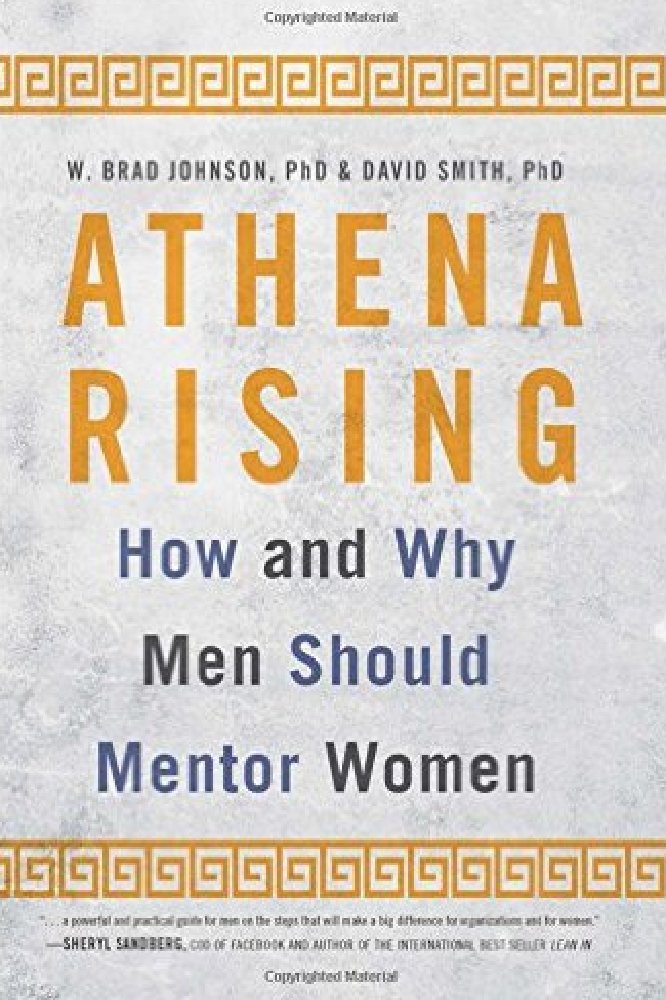By David G. Smith, Ph.D. and W. Brad Johnson, Ph.D.

Athena Rising
Junior women are often told to “go find a mentor.” Yet when they look around for someone who looks like them at higher levels in their organization, it may be difficult to find senior women. In many organizations, there just aren’t many senior women, and those who have risen to positions of power frankly don’t have enough hours in the day to mentor all the junior women coming through the door. So why can’t senior men mentor junior women? The answer, of course, is that they can mentor talented women with the same frequency and care that they mentor men. Yet studies continue to show that male mentors are less likely to mentor junior women. In our book, Athena Rising: How and Why Men Should Mentor Women, we call this the “reluctant male syndrome.” Here’s a list of the most prevalent reasons why men are reluctant to mentor women.
- The outdated notion that only women can mentor women. This myth is based on messages men have learned growing up that women/girls are fragile, delicate, even mysterious creatures that men could not possibly begin to understand, let alone guide and support. This translates at work into men’s perceived inability to relate to women’s personal experiences or professional dilemmas.
- The myth that women don’t have the right stuff for senior management positions. This belief is grounded in stereotypes that cast men as strong leaders, but paint women as lacking the assertiveness or aggressiveness to be successful leaders. The other aspect of this belief is related to benevolent sexism—women are nice, but weak and can’t handle the demanding world of management.
- A fear that a woman might cry if a mentor gives her honest, direct feedback. This is a corollary to the women are nurturing, but too thin-skinned to compete mindset. This is reinforced in boys across their childhood as most activities are structured and contextualized in terms of competition which is then operationalized at work in competitive, “dog eat dog” environments.
- The perception that women are too emotional. In western culture and society, girls/women learn that expressing emotions is acceptable and expected in many situations. Boys, of course, are often shamed for crying and expressing emotions.
- A belief—conscious or not—that a woman is a risky mentoring investment; after all, she’ll eventually leave to have children. This “maternal wall” is a widely-held bias based on historical male career patterns. Women’s caregiver roles are over-emphasized and this focus creates a perception that women are overcommitted outside of work.
- Many men don’t know how to do nonsexual intimacy in relationships with women. A relationship with mothers, wives or daughters—sure, but a nonsexual professional relationship with a woman at work—just weird. Some men can even be anxious about cross-gender relationships. But resorting to relationships they know with female family members often leads men to use these “manscripts” in ways that are not helpful for mentees.
- Fear of responding to increasing intimacy with sexual overtures. Many men assume that they are unable to use the decision-making part of their brain to overcome biological and evolutionary feelings of attraction.
- Fear of rumors, perception, and social scrutiny. Perceptions are reality and many men avoid cross-gender mentoring relationships because they are afraid of what their peers and co-workers will think and say.
- Worry about what their spouse/partner will think. Some guys ruminate on the question, “what will my wife say if I start spending so much time with a younger woman at work?”
- Concern that he might slip and say/do the wrong thing. In today’s world of lawsuits, some men don’t perceive the gain of mentoring talented women as offsetting the risk that he could inadvertently offend her, or worse, lead her to think that he is sexually harassing her.

W. Brad Johnson, PhD is professor of psychology in the Department of Leadership, Ethics, and Law at the United States Naval Academy, and a faculty associate in the Graduate School of Education at Johns Hopkins University. A clinical psychologist and former Lieutenant Commander in the Navy’s Medical Service Corps, Dr. Johnson served as a psychologist at Bethesda Naval Hospital and the Medical Clinic at Pearl Harbor where he was the division head for psychology. He is a fellow of the American Psychological Association and recipient of the Johns Hopkins University Teaching Excellence Award.

David Smith, PhD is an active duty U.S. Navy Captain and permanent military professor in the Department of Leadership, Ethics, and Law at the United States Naval Academy having served four years as the chair. A former Navy Pilot, Dr. Smith led diverse organizations of women and men culminating in command of a squadron in combat and flew more than 3,000 hours over 19 years including combat missions in Iraq and Afghanistan. As a sociologist trained in military sociology and social psychology, he focuses his research in gender, work, and family issues including dual career families, military families, women in the military, and retention of women.

